
How to Stop Worrying and Start Living
I recently ran into an acquaintance who has lost about 40 lbs. since the pandemic began. He seems happier, more energetic, and more congenial than he did in the pre-COVID days. He commented about realizing what a really nice person his wife is, which he discovered while being isolated with her during a shelter-in-place order. Despite being in a high stress position and facing uncertainty with his home and job, he is lifting weights, eating well, and looks about 5 years younger than he did in February. I marveled at how the same event that seems to have taken years off his life is aging others. He didn’t seem to have a worry in the world, and yet I know he has the same daily worries as everyone else.
The stark improvements in this young man raised the question in my mind: What do resilient people tend to do that differentiates them from others? Below are a few of the qualities I discovered:
They have a willingness to “suffer.” They seek out forms of suffering to increase their resilience. Some crazy souls even suffer and refer to it as fun (think marathon runners, polar bear swimmers and long-distance cyclists).
They refuse to worry about things they can’t control. If possible, they look for solutions or workarounds.
They are meticulous about who they hang out with. They tend to seek out others who share their philosophy and support their desire to remain positive. They avoid naysayers or those that seem to make the situation worse.
They use humor as a coping mechanism and their wit often helps others cope. They may even turn to funny movies, videos or other forms of comic relief to distract themselves and improve their frame of mind.
This man’s positive response to our current world events triggered my memory of a book from many years ago that addressed this same subject. The book was How to Stop Worrying and Start Living by Dale Carnegie (1944).

This gem was originally copyrighted before the end of World War II, which was probably the one other event in the last 100 years that had adversely affected the population of almost every country. The “greatest generation” that survived this event gained a well-earned reputation for their resilience.
The book contains many vignettes that even in today’s world, everyone can relate. Carnegie’s formula for overcoming worry, in summary, was as follows:
Get the facts.
After carefully weighing all the facts, come to a decision.
Once you reach a decision – ACT! Get busy carrying out your decision – and dismiss all anxiety about the outcome.
If your worry about a specific problem persists, answer the following questions – in writing:
- What is the problem?
- What is the cause of the problem?
- What are all the possible solutions?
- What is the best solution?
When I processed my current “worries” through the Dale Carnegie formula, I realized they are all what are now called “First-World Problems.” In fact, some of them were so ridiculous that the process immediately re-oriented my thinking and provided a completely new perspective. It also reinforced the idea that our worries will not go away when this pandemic ends. There will always be things that could cause us to worry. However, with Carnegie’s simple formula, perhaps we can all improve upon how we deal with them.
Kristina Bolhouse CPA/PFS, CFP®
Vice President/Shareholder
© 2020 The Arkansas Financial Group, Inc., All rights reserved.
Please remember that past performance may not be indicative of future results. Different types of investments involve varying degrees of risk, and there can be no assurance that the future performance of any specific investment, investment strategy, or product (including the investments and/or investment strategies recommended or undertaken by The Arkansas Financial Group, Inc. (“AFG”), or any non-investment related content, made reference to directly or indirectly in this newsletter will be profitable, equal any corresponding indicated historical performance level(s), be suitable for your portfolio or individual situation, or prove successful. Due to various factors, including changing market conditions and/or applicable laws, the content may no longer be reflective of current opinions or positions. Moreover, you should not assume that any discussion or information contained in this newsletter serves as the receipt of, or as a substitute for, personalized investment advice from AFG. To the extent that a reader has any questions regarding the applicability of any specific issue discussed above to his/her individual situation, he/she is encouraged to consult with the professional advisor of his/her choosing. AFG is neither a law firm, nor a certified public accounting firm, and no portion of the newsletter content should be construed as legal or accounting advice. A copy of AFG’s current written disclosure Brochure discussing our advisory services and fees is available upon request.
Please Note: If you are a AFG client, please remember to contact AFG, in writing, if there are any changes in your personal/financial situation or investment objectives for the purpose of reviewing/evaluating/revising our previous recommendations and/or services, or if you would like to impose, add, or to modify any reasonable restrictions to our investment advisory services. AFG shall continue to rely on the accuracy of information that you have provided.
 Form CRS/ADV & Disclosures.
Form CRS/ADV & Disclosures. 